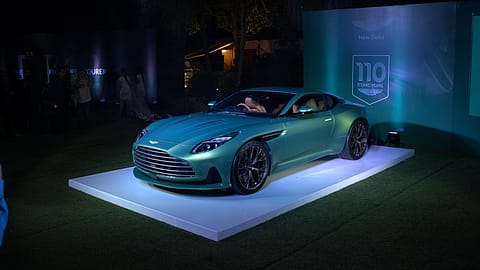How the India–UK trade deal benefits luxury car buyers
British luxury carmakers McLaren, Bentley, Rolls-Royce, Aston Martin, and JLR are expected to gain increased market access in India.

The India–United Kingdom Comprehensive Economic and Trade Agreement (CETA) is set to bring cheer to luxury car buyers in India as imported Rolls-Royce, Aston Martin, McLaren, Bentley, and Jaguar Land Rover (JLR) cars will see a drop in prices following a staggered reduction in customs duty once the British Parliament ratifies the deal.
The free trade agreement slashes the duty on internal combustion engine (ICE) passenger car imports from the UK to 10% over a period of five years under a quota system. In the first year, the 110% customs duty on petrol cars (with engines exceeding 3,000cc) and diesel vehicles (exceeding 2,500cc) imported to India from the U.K. will be reduced to 30% for 10,000 cars.
For mid-sized petrol-cars up to 3,000 cc and diesel-powered vehicles up to 2,500 cc, the tariff will come down to 50% in the first year from 66% currently for a limited number of cars. This will be followed by a 10% reduction each year, culminating with just 10% by the fifth year.
“This represents a significant reduction—ranging from 16% to 56% over a period of up to 5 years for ICE vehicles up to 2,500 cc (Diesel) / 3,000 cc (Petrol), and from 80% to 100% over 5 years for ICE vehicles above 2,500 cc (Diesel) / 3,000 cc (Petrol),” says Saurabh Agarwal, Partner and Automotive Tax Leader, EY India.
“These reductions are expected to make UK-origin vehicles more accessible to India’s upper-middle class at comparatively lower prices. A quota of 20,000 to 37,000 vehicles is allowed during the first five years and then reduces to 15,000 annually from the 15th year onwards for availing the concessional duty rates,” Agarwal says, adding that for out-of-quota vehicles, the duty is proposed to be reduced to 50% over a period of 10 years.
The UK-based luxury automobile brands such as McLaren, Bentley, Rolls-Royce, Aston Martin, and JLR, among others, are expected to gain increased market access in India, says Agarwal.
Agrees, Sunil Kalra, Partner, Governance, Risk and Compliance & Forensic Investigation at Forvis Mazars. “The India-U.K. FTA presents a major opportunity for British luxury carmakers like Rolls-Royce, Bentley, Aston Martin, and McLaren. With potential tariff cuts on fully imported vehicles, these brands can finally become more price-competitive in India, a market that’s fast maturing in the luxury segment,” says Kalra.
Recommended Stories
Despite softening of demand for passenger cars in India’s mass market this year, the ultra-luxury segment has held firm, driven by a growing base of high-net-worth individuals (HNIs) and rising demand from Tier II cities, says Kalra. “The FTA could accelerate this momentum by making imports more affordable, improving after-sales access, and encouraging brands to invest more in local presence and experience centres. For British luxury brands, India is no longer just aspirational, it’s commercially viable,” he adds.
To be clear, the import duty concessions will not be available on hybrid and electric vehicles for the first five years. The customs duty on EVs with cost, insurance, and freight (CIF) value of over £40,000 (around ₹46.49 lakh) will be reduced progressively to 10% from the sixth year to the tenth year of the CETA. To protect homegrown carmakers, no duty relief will be provided for EVs with CIF value of under £40,000.
“The Tariff Rate Quota (TRQ) marks a major policy shift, especially as India has long used high tariffs to protect its domestic automotive industry. By year five, up to 37,000 UK-built ICE vehicles could enter India annually at just 10% duty—far below the current base rate of 110%. This creates a preferential entry path for high-end British brands such as Jaguar and Land Rover, both owned by Tata Motors, but also for opening India’s tightly controlled automobile market to bilateral trade partners—potentially triggering similar demands in future FTAs,” says trade policy think tank GTRI.
This is India’s first-ever auto tariff concession in any FTA, and it’s likely to trigger similar demands from Japan, the EU, South Korea, and the U.S., GTRI adds.
(INR CR)
Hailing the free trade agreement between the UK and India, Tata Motors-owned JLR stated that the deal will deliver reduced tariff access to the Indian car market for JLR's luxury vehicles over time. “India is an important market for our British built products and represents significant future growth opportunities,” it said.
The U.K., too, has slashed import duty on 'Made in India' electric, hybrid and hydrogen vehicles to zero from the sixth year onwards. It will be done under a quota system starting from 17,600 units and increasing to 88,000 units.
This means EVs, hybrids, and hydrogen-powered vehicles manufactured in India will be allowed into the United Kingdom without incurring any customs duties from the sixth year. At present, these imports attract a 10% duty in the UK.
While Indian automakers mostly export cars to Africa, Latin America and Southeast Asia, the U.K. has not been their go-to destination. But, all this could change as Indian brands such as Mahindra & Mahindra (M&M) and Tata Motors launch premium EVs.
In the long term, Indian automakers are also expected to gain enhanced access to the UK market for their green vehicle offerings, says EY India's Agarwal.
While talking to newswire PTI, Anish Shah, Group CEO & MD, Mahindra Group, said that M&M will be able to export to the U.K., strengthening the Indian industry.
TVS Motor Company MD Sudarshan Venu, who accompanied Prime Minister Narendra Modi to the UK along with Shah, had earlier said that the historic India-UK Free Trade Agreement will help the automaker’s British motorcycle brand Norton in scaling faster and leveraging common supply chains. Norton is set to roll out its first motorcycle this year.